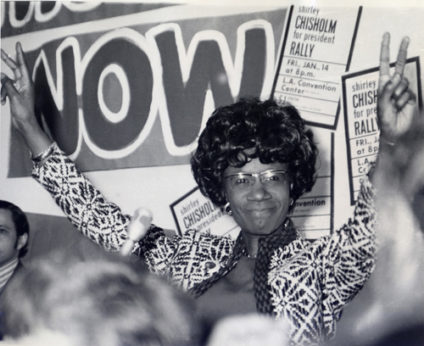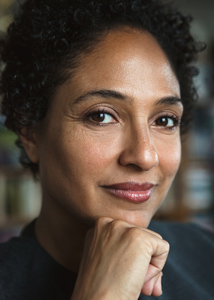
1972 was an extraordinary year. Richard Nixon was president, running for his second, ill-fated term. The voting age had just changed from 21 to 18, and millions of new voters were expected at the polls. The Vietnam War was in full swing, as were anti-war protests, a burgeoning women’s movement and the rise of the Black Panther Party.
Into the center of this maelstrom — shocking the conventional political wisdom — stepped Shirley Chisholm, a determined, rather prim and unapologetically progressive Black woman with a powerful message: Exercise the full measure of your citizenship: vote and assert your rights. Quoting Frederick Douglass, Chisholm, who died Jan. 1, liked to remind her audience that “power concedes nothing without demand or struggle.”
 Announcing her candidacy for president on the evening news, Walter Cronkite quipped, “A new hat — rather a bonnet — was tossed into the presidential race today.” As P.O.V. “Chisholm ’72 — Unbought & Unbossed,” a feature documentary airing on PBS Monday, Feb. 7, 10:00-11:30 p.m. (check local listings), reveals, this first-ever run by a woman and person of color for presidential nomination was no laughing matter. Nor was it a polite exercise in symbolic electioneering. The New York Democratic congresswoman’s bid engendered strong and sometimes bigoted opposition, setting off currents that affect American politics and social perceptions to this day.
Announcing her candidacy for president on the evening news, Walter Cronkite quipped, “A new hat — rather a bonnet — was tossed into the presidential race today.” As P.O.V. “Chisholm ’72 — Unbought & Unbossed,” a feature documentary airing on PBS Monday, Feb. 7, 10:00-11:30 p.m. (check local listings), reveals, this first-ever run by a woman and person of color for presidential nomination was no laughing matter. Nor was it a polite exercise in symbolic electioneering. The New York Democratic congresswoman’s bid engendered strong and sometimes bigoted opposition, setting off currents that affect American politics and social perceptions to this day.
Featuring stirring archival footage, period music, interviews with supporters, opponents and observers, and Chisholm’s own commentary — then and now — “Chisholm ’72” is a remarkable recollection of a campaign that broke new ground in politics and truly reached out to “the people.” Among those interviewed are author/activist Amiri Baraka (then known as LeRoi Jones), Black Panther founder Bobby Seale, authors Susan Brownmiller and Octavia Butler, former Congressmen Rev. Walter Fauntroy and Ronald Dellums, Congresswoman Barbara Lee (D-California), who got her start in politics with Chisholm’s campaign, and journalist/historian Paula Giddings.
Chisholm championed the causes of the poor, the young, minorities, gays, women and other marginalized Americans. In doing so, she prefigured Jesse Jackson’s Rainbow Coalition campaigns, not only in substance but also in style. Chisholm saw the presidential race itself as an opportunity to draw to politics people who traditionally did not participate.
In her words, “I ran for the presidency, despite hopeless odds, to demonstrate sheer will and refusal to accept the status quo.” In a race with 12 other candidates, Chisholm’s ultimate goal was to reach the Democratic National Convention in 1972 with a strong show of support.

At a time when Americans were just beginning to contemplate the possibility of a black man running for president, Chisholm was black and female. (The first woman to run for president was Victoria Woodhull, who ran on the Equal Rights Party ticket and lost to incumbent President Ulysses S. Grant in 1872.) “Chisholm ’72” describes Chisholm’s formative years, from modest roots in Brooklyn’s Bedford-Stuyvesant neighborhood and a childhood in Barbados, to winning election to the New York State Assembly and then, in 1968, to become the first Black woman ever elected to the U.S. Congress. Although she was no stranger to controversy, the documentary reveals the visceral opposition and blatant disregard the establishment and the media showed the Congresswoman’s candidacy.
Many reporters assumed she had no chance of winning and felt she was a spoiler. Feminists, who agreed entirely with Chisholm’s politics, preferred a different strategy, looking to Sen. George McGovern as the realistic Democratic candidate. (McGovern eventually won the nomination.)
All the while, Chisholm remained the “unbought and unbossed” candidate, poised and determined to direct the debate and news coverage of her candidacy to her stands on education, employment, health care and the rights of minorities, women and gays to full participation in American life. She won a federal court order to break the front-runners’ lock on televised debates, winning the chance to talk directly to a national television audience. Chisholm, in fact, struck a populist progressive chord with many Americans. Managing surprisingly strong showings in some state primaries, she carried 151 delegates at the severely divided 1972 Democratic Convention in Miami and won the right to speak from the main podium.
“I had something important to explain,” recalls Chisholm about her historic speech. “I ran because somebody had to do it first. I ran because most people thought the country was not ready for a black candidate, not ready for a woman candidate. Someday — it was time in 1972 to make that someday come.”
“Chisholm ’72 — Unbought & Unbossed” recaptures the times and spirit of a watershed event in American politics, when a black woman dared to take an equal place on the presidential dais.

“Our goal was to make a documentary as passionate and powerful as Chisholm herself,” says director and co-producer Shola Lynch. “Her story is an important reminder of the power of a dedicated individual to make a difference.” It also reminds us that the country belongs to each of us only if we dare to claim our place in it.”
- Film Length: 75 min.
- Premiere Date: Feb. 7, 2005
- Filmmaker: Shola Lynch











